中英文写作差异共27页
中英文语言差异英语作文
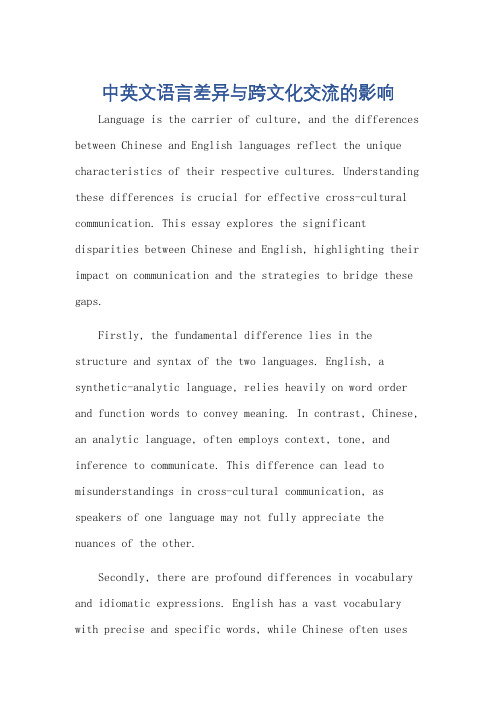
中英文语言差异与跨文化交流的影响Language is the carrier of culture, and the differences between Chinese and English languages reflect the unique characteristics of their respective cultures. Understanding these differences is crucial for effective cross-cultural communication. This essay explores the significant disparities between Chinese and English, highlighting their impact on communication and the strategies to bridge these gaps.Firstly, the fundamental difference lies in the structure and syntax of the two languages. English, a synthetic-analytic language, relies heavily on word order and function words to convey meaning. In contrast, Chinese, an analytic language, often employs context, tone, and inference to communicate. This difference can lead to misunderstandings in cross-cultural communication, as speakers of one language may not fully appreciate the nuances of the other.Secondly, there are profound differences in vocabulary and idiomatic expressions. English has a vast vocabulary with precise and specific words, while Chinese often usesmore general terms with rich contextual meanings. Idioms and phrasal verbs in English can be particularly challenging for non-native speakers to understand, as they often carry cultural connotations. Similarly, Chinese proverbs and allegorical expressions can be opaque to English speakers unfamiliar with Chinese culture.Furthermore, the differences in pragmatics and discourse patterns between Chinese and English can affect communication. Chinese culture tends to value indirectness and collectivism, preferring to convey messages implicitly and emphasizing group harmony. In contrast, English culture often favors directness and individualism, preferring explicit communication and highlighting personal opinions. These differences can lead to misinterpretations and communication breakdowns in cross-cultural settings.To overcome these challenges, it is essential to cultivate cultural awareness and sensitivity. Learning a language involves more than just grammar and vocabulary; it also requires understanding the cultural context and norms that underlie the language. Through exposure to diverse cultural materials, such as literature, films, and music,language learners can develop a deeper understanding of the cultural subtleties of the target language.Additionally, the use of technology and modern communication tools can aid in bridging the language gap. Machine translation and language learning apps have become increasingly popular, enabling individuals to access information and communicate across languages more easily. However, it is important to note that these tools are not perfect and should be used with caution, as they may not always capture the nuances and cultural implications of language.In conclusion, the differences between Chinese and English languages reflect the unique characteristics of their respective cultures. Understanding these differences and developing cultural awareness are crucial for effective cross-cultural communication. By bridging the language gap and fostering mutual understanding, we can enhance cross-cultural interactions and promote global connectivity.**中英文语言差异与跨文化交流的影响**语言是文化的载体,中英文之间的差异体现了各自文化的独特特征。
《中英文写作差异》课件

Summary words: Differences in vocabulary selection
Detailed description: There are significant differences in vocabulary selection between Chinese and English writing. Chinese usually uses concrete and vivid vocabulary to describe things, while English tends to use abstract and general vocabulary. In addition, there are a large number of four character idioms and fixed collocations in Chinese, which may not have a direct corresponding expression in emphasizes hierarchy and respect for elders, while English culture emphasizes equality and individual freedom This difference can be seen in Chinese writing, which often reflects the importance of hierarchy and respect for authority, while English writing tens to focus more on individual rights and freedoms
目录
CONTENTS
中英文写作的异同
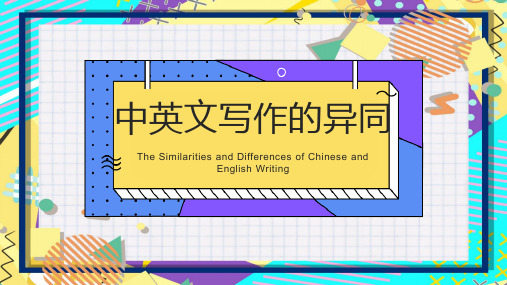
life and squeeze from it the
后已。这病使她多么羡慕人家的健
last drop of happiness.It made her envy health,bt it also made her sentimental
康,也使她多愁善感,见一叶飘零,
V S 随风入室,使愁绪满怀,无以自解。
VS
汉语轻时体
英文特有的符号
(1)单引号(‘) (2)连字号(-) (3)斜线号(/) 该符号主要起分割作用,如It could be for staff and/or students.
中文特有的符号
标点符号
VS
(1)中文的句号是空心圈 (。),英文的句号是小点. (2)英文的省略号是三个点 (...),位置在行底;中文的为 六个点(.......),居于行中。 (3)英文的破折号是(-),中 文的是(—)。
英文写作:竹节句法
中文写作:流水句法
语言学家用“竹节句法“来比喻英语句 句型结构 汉语句子则被喻为“流水句法”,所谓的
子,即英语句子是由断不可缺的各种连
流水指少用乃至不用连接词仍行文流畅。
接词衔接而成,宛如节节相连的竹子。
汉语重意和,如果没有连接词,只从句子
英语重形和,英语句子如果缺少连接词
本身的意思就可以把概念关系表达清楚。
V
S
中文写作强调婉转、含蓄的表达。 曲线思维:在表达思想时,从侧面说明、 阐述外围的环境,最后点出话语的信息中 心。 B. As you know, I am now a college student at H University. I am enjoying my classes very much but I have a problem and I was wondering if you could help me.
英语作文范文-英语写作中的英汉表达差异

英语作文范文英语写作中的英汉表达差异一、首先,让我们关注一下英美人与中国人思维方式的不同。
英美人的思维方式是直线式的,他们在遣词造句谋篇上遵循着从一般(general)到具体(specific),从概括(summarize)到举例(exemplify),从整体(whole)到个体(respective)的原则。
请看短文:Soccer is a difficult sport.(1)A player must be able to run steadily without rest.(2)Sometimes a player must hit the ball with his or her head.(3)Players must be willing to bang into and be banged into by others.(4) They must put up with aching feet and sore muscles.上面的这则短文中,主题句(main idea sentence)也就是文章的中心是第一句,(1)(2)(3)(4)句是用来说明主题句的。
而在汉语中,我们习惯于先分后总,先说原因后说结果,即所谓的“前因后果”,如果要表达相同的意思,我们通常这样说:足球运动员必须能不停地奔跑,有时得用头顶球,撞别人或被别人撞,必须忍受双脚和肌肉的疼痛,所以说,足球运动是一项难度大的运动。
再比如写下面一则便条,因你母亲突然生病,周末你不能和汤姆去跳舞了,你找了舞跳得很好的时黛来代替你,并表示抱歉。
此英语便条为:July 6,2002Dear Tom,I am sorry to inform you that I won’t be able to go to dance with you this weekend. My mother is suddenly takenill.In order not to disappoint you,I have asked Shi Dai to take my place.She is a better dancer,I think.My regrets.Joe从便条中可以看出,英语表达先“果”—I won’t be able to go to dance with you this weekend后“因”—my mother is suddenly taken ill,即所谓的“先果后因”。
英语作文范文-英语写作中英汉表达差异

英语作文范文英语写作中英汉表达差异英汉表达差异中国人与西方人看问题方法在许多方面存在着差异,而且这种差异确确在束缚着中国学生,成为他们英文写作中拦路虎,使他们不能畅所欲言,不能准确而简洁地表达思想。
因此,本文就大学英语写作中常出现问题谈谈英汉表达几种差异。
思维方式的差异一、首先,让我们关注一下英美人与中国人思维方式不同。
英美人思维方式是直线式,他们在遣词造句谋篇上遵循着从一般(general)到具体(specific),从概括(summarize)到举例(exemplify),从整体(whole)到个体(respective)原则。
请看短文:Soccer is a difficult sport.(1)A player must be able to run steadily without rest.(2)Sometimes a player must hit the ball with his or her head.(3)Players must be willing to bang into and be banged into by others.(4)They must put up with aching feet and sore muscles.上面这则短文中,主题句(main idea sentence)也就是文章中心是第一句,(1)(2)(3)(4)句是用来说明主题句。
而在汉语中,我们习惯于先分后总,先说原因后说结果,即所谓“前因后果”,如果要表达相同意思,我们通常这样说:足球运动员必须能不停地奔跑,有时得用头顶球,撞别人或被别人撞,必须忍受双脚和肌肉疼痛,所以说,足球运动是一项难度大运动。
再比如写下面一则便条,因你母亲突然生病,周末你不能和汤姆去跳舞了,你找了舞跳得很好时黛来代替你,并表示抱歉。
此英语便条为:July 6,2002Dear Tom,I am sorry to inform you that I won’t be able to go to dance with you this weekend. My mother is suddenly taken ill. In order not to disappoint you, I have asked Shi Dai to take my place. She is a better dancer, I think. My regrets.Joe从便条中可以看出,英语表达先“果”—I won’t be able to go to dance with you this weekend后“因”—my mother is suddenly taken ill,即所“先果后因”。
英语和中文的差异英语作文

英语和中文的差异英语作文English:One major difference between English and Chinese is the word order. In English, the basic word order is subject-verb-object (SVO), such as "I love you". However, in Chinese, the basic word order is subject-object-verb (SOV), such as "我爱你" (I love you). Another difference is the use of articles. English has definite (the) and indefinite (a/an) articles, while Chinese does not use articles at all. Additionally, English has a larger vocabulary compared to Chinese, with a more complex system of verb tenses. Chinese, on the other hand, relies heavily on context and tone to convey meaning. Furthermore, Chinese characters are logographic, where each character represents a word or a morpheme, while English uses an alphabet-based system. These differences make learning both languages challenging but rewarding in their own ways.中文翻译:英语和中文之间的一个主要区别是词序。
汉语与英文两种语言之间的差异的英文作文

汉语与英文两种语言之间的差异的英文作文Differences Between Chinese and EnglishLanguages are a fundamental aspect of human communication and culture. Chinese and English are two of the most widely spoken languages in the world, but they differ significantly in terms of grammar, vocabulary, and pronunciation. Understanding these differences can help us appreciate the unique characteristics of each language and improve our ability to communicate effectively.One of the most striking differences between Chinese and English is the structure of the languages. Chinese is a tonal language, meaning that the pitch or intonation of a word can change its meaning. There are four tones in Mandarin Chinese, each of which conveys a different meaning. For example, the word "ma" can mean mother, hemp, horse, or scold, depending on the tone used. In contrast, English is a non-tonal language, where word meaning is primarily determined by word order, context, and stress. This fundamental difference in structure can make learning Chinese challenging for English speakers and vice versa.Another key difference between Chinese and English is the writing system. Chinese characters are logograms, which means that each character represents a word or a morpheme. There are thousands of characters in the Chinese writing system, each with its own unique meaning and pronunciation. In contrast, English uses an alphabet with 26 letters to represent sounds. While the English alphabet is relatively simple to learn, mastering Chinese characters can be a lifelong endeavor.Vocabulary is another area where Chinese and English differ. Chinese vocabulary is largely monosyllabic, meaning that most words are made up of a single syllable. English, on the other hand, has a mix of monosyllabic and polysyllabic words. Chinese also relies heavily on idiomatic expressions and set phrases, which can pose difficulties for English speakers trying to learn the language. Additionally, Chinese has a rich collection of homophones, words that sound alike but have different meanings, which can lead to confusion for language learners.Pronunciation is another area where Chinese and English diverge. Chinese has a limited number of syllables, and many sounds are distinct and easily distinguishable. English, on the other hand, has a wide range of vowel and consonant sounds, making it a more challenging language to pronounce accurately.English also has a complex system of stress and intonation, which can greatly affect the meaning of a sentence. Chinese speakers may struggle with the pronunciation of English sounds such as the th sound, while English speakers may have difficulty with the tones of Mandarin Chinese.Despite these differences, Chinese and English also share some similarities. Both languages have a rich literary tradition and a long history of written literature. Both languages also have a diverse range of dialects and regional variations, which can make communication between speakers of different dialects challenging. In today's globalized world, it is increasingly important to be able to communicate across linguistic and cultural boundaries, and understanding the differences between Chinese and English can help facilitate this communication.In conclusion, Chinese and English are two of the most widely spoken languages in the world, but they differ significantly in terms of grammar, vocabulary, and pronunciation. Understanding these differences can help us appreciate the unique characteristics of each language and improve our ability to communicate effectively. While learning a new language can be challenging, it can also be a rewarding experience that opensup new opportunities for cross-cultural communication and understanding.。
英文和中文的差异英语作文
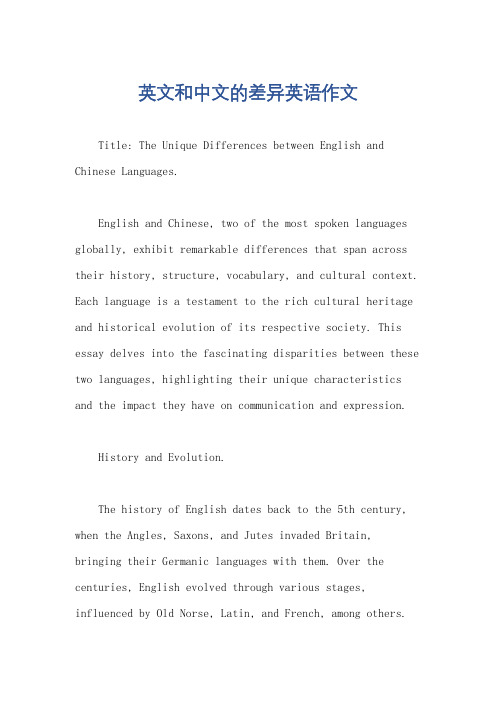
英文和中文的差异英语作文Title: The Unique Differences between English and Chinese Languages.English and Chinese, two of the most spoken languages globally, exhibit remarkable differences that span across their history, structure, vocabulary, and cultural context. Each language is a testament to the rich cultural heritage and historical evolution of its respective society. This essay delves into the fascinating disparities between these two languages, highlighting their unique characteristics and the impact they have on communication and expression.History and Evolution.The history of English dates back to the 5th century, when the Angles, Saxons, and Jutes invaded Britain, bringing their Germanic languages with them. Over the centuries, English evolved through various stages, influenced by Old Norse, Latin, and French, among others.Conversely, Chinese, with a history spanning over 4,000 years, is believed to have originated from the scripts of the Shang Dynasty. Chinese script, known as Hanzi, has remained relatively unchanged through the years, retaining its original logographic form.Structural Differences.English is a language that follows the Subject-Verb-Object (SVO) structure, where the subject performs the action denoted by the verb on the Object. This structure forms the backbone of English sentences, governing the order of words and phrases. Chinese, however, exhibits a more flexible structure, often following the Subject-Verb (SV) pattern, with the Object appearing before the Verb. This allows for a more free-flowing sentence structure, where words and phrases can be rearranged without altering the meaning.Vocabulary Divergence.The vocabulary of English and Chinese differssignificantly in terms of origin, meaning, and usage. English, being a Germanic language, has borrowed words from various languages, resulting in a rich lexicon with words from Latin, French, Greek, and even Arabic. Chinese, on the other hand, boasts a vast vocabulary derived from its own historical and cultural context. Hanzi, the written form of Chinese, consists of ideograms that represent concepts or ideas, often incorporating elements of nature, mythology, or daily life.Cultural Context.The cultural context of English and Chinese isreflected in their respective languages. English, being the language of global communication, often carries a neutral or universal tone, allowing for a more objective and analytical approach to communication. Chinese, on the other hand, is deeply rooted in its cultural heritage, reflecting values such as harmony, respect, and collectivism. This cultural influence is evident in the way Chinese is spoken and written, with an emphasis on context and implied meanings.Conclusion.In conclusion, the differences between English and Chinese languages are vast and diverse, reflecting the unique historical, cultural, and structural backgrounds of each. English, with its global reach and analytical precision, has become the lingua franca of the world. Chinese, with its deep cultural roots and flexible language structure, remains a powerful testament to the rich heritage of the East. Understanding these differences is crucial in bridging cultural gaps and promoting effective communication across borders.。
中英写作的区别Differences_between_English_Writing_and_Chinese_Writing

East China ► 华南 South China ► 钢铁 iron and steel ► 轻重 heavy and light ► 左右 right and left ► 新旧 old and new ► 工农业 agriculture and industry ► 中小型 small and medium sizes ► 新郎新娘 bride and bridegroom ► 手疾眼快 quick eye and deft hand
句, 那個是子句, 英文則需要區分主句及子句. ► After my brother had left college, he went abroad to the States. ► If John had the chance to do the work, he would do it another way. ► 主要名詞 (my brother) 與代名詞 (he) 應分 別置於主句與从句.
1.10 on the phone Mary told me the news on phone. ► √ Mary told me the news on the phone. ► 1.11 piano ► A pianist is one who plays piano. ► √ A pianist is one who plays the piano. ► 1.12 Unite States ► Have you ever been to Unite States? ► √ Have you ever been to the Unite States? (the Netherlands, the Philippines) ► Incorrect insertion ► 1.13 after breakfast ► Where will you go after the breakfast? ► √ Where will you go after breakfast? ► 1.14 arms ► The people took up the arms against the tyrant. ► √ The people took up arms against the tyrant.
中英写作差异英语作文

中英写作差异深度解析In the realm of writing, Chinese and English languages present distinct characteristics that impact the waywriters approach their craft. These differences are profound and range from the fundamental structure of sentences to the cultural nuances embedded within the language. Understanding these disparities is crucial for writers who strive to communicate effectively across cultures.The first significant difference lies in sentence structure. Chinese sentences tend to be more flexible and flowery, often lacking a clear subject or predicate. Instead, Chinese sentences rely on context and word order to convey meaning. By contrast, English sentences are more rigid, adhering to a strict subject-verb-object structure. This difference affects how writers approach sentence construction, with Chinese writers often employing parallel structures and repetition to emphasize certain points, while English writers rely more on grammar and punctuation to clarify meaning.Another key difference lies in the use of parallelism and coordination. Chinese writing often employs parallel structures, with phrases and clauses arranged in parallel to emphasize their equality and importance. This approach creates a rhythmic and harmonious flow, reflecting the balance and harmony valued in Chinese culture. In contrast, English writing tends to favor coordination, using coordinating conjunctions to link ideas together. This approach allows for more complexity and variety in sentence structure, reflecting the emphasis on logic and clarity in English language writing.The use of personal pronouns also differs between the two languages. Chinese writing tends to avoid the explicit use of personal pronouns, preferring instead to rely on context and implied meaning. This approach reflects the collectivistic nature of Chinese culture, where individuals often subordinate their own needs and identities to the group. By contrast, English writing makes frequent use of personal pronouns, reflecting the individualistic nature of Western culture and the importance of expressing individual thoughts and feelings.Finally, the tone and style of writing vary between Chinese and English. Chinese writing tends to be more implicit and indirect, relying on metaphor, simile, and allusion to convey meaning. This approach reflects the value placed on harmony and politeness in Chinese culture, where directness can be considered rude or intrusive. By contrast, English writing tends to be more direct and explicit, with a focus on clarity and precision. This approach reflects the emphasis on logic and objectivity in Western culture and the value placed on direct communication.In conclusion, the differences between Chinese and English writing are profound and reflect the distinct cultural values and traditions of each language. Understanding these disparities is essential for writers who wish to communicate effectively across cultures. By appreciating the unique characteristics of each language and adapting their writing style accordingly, writers can ensure that their message is accurately and effectively conveyed to a global audience.**中英写作差异深度解析**在写作领域,中文和英文两种语言呈现出截然不同的特点,影响着作家们的创作方式。
中英文差异英语作文

中英文差异英语作文The Differences Between Chinese and English Writing。
中英文差异英语作文。
As we all know, Chinese and English are two of the most widely spoken languages in the world. However, there are many differences between the two when it comes to writing. In this essay, we will explore some of the key differences between Chinese and English writing.首先,中文和英文在书写方式上有很大的不同。
中文是一种象形文字,每个汉字都代表一个词汇或概念。
而英文则是一种音标文字,由26个字母组成,每个字母代表一个音素。
因此,学习者需要掌握不同的书写技巧和规则。
Firstly, there are significant differences in the way Chinese and English are written. Chinese is a logographic language, with each character representing a word or concept, while English is an alphabetic language, comprisedof 26 letters, each representing a phoneme. As a result, learners need to master different writing techniques and rules.其次,中文和英文在语法结构上也有很大的不同。
中文的语法结构相对简单,主谓宾的句子结构是最常见的。
中英文写作的不同1

• 儒家文化亦讲求“天人之际,合二为一”,中国文化的最高境界 也是讲求“天人合一”,达到人与自然的和谐相处。
• 中国古代思想家对自然始终抱有一种神秘感,很少提认识自然、 改造自然。
(二)悟性直觉与理性逻辑
• 林语堂认为:“中国人的头脑羞于抽象的词 藻,喜欢妇女的语言。中国人的思维方式是 综合的、具体的。”“中国人在很大程度上 依靠直觉去揭开自然界之谜”。
• 中国传统思维重视经验悟性直觉思维,西方 传统思维重视理性逻辑思维。
(三)有机性与机械性
• 中西方思维方式的另一重要区别是,中国传 统思维注重整体,有机性、辩证性突出,而 西方传统思维注重具体,机械性、形而上学 明显。
2020/1/4
中英文写作差异之干:现象比较
——从技术角度具体分析中英文写作的差异
1.语篇结构 2.语言风格 3.篇章主题
2020/1/4
语篇结构
• 篇章的组织方式反映了人的思维模式,英 语的段落模式与汉语的段落模式有很大的 不同。
1.英语篇章的组织和发展是“直线型”,即直截了 当地陈述主题,进行论述;
(五)义利观念、法制观念的差异
• 在中国,由于受儒家思想的影 响,人们重义轻利,而且也有 轻法制的倾向。
• 西方国家,人们法制意识比较 强。
(六)女士优先和男尊女卑
• 在欧美等西方国家,尊重妇女是其传统风俗,女士优 先是西方国家交际中的原则之一。
• 在中国,由于受封建礼制男尊女卑观念的影响,男性 往往倍受尊重。
• 一个社会群落的基本价值观念一旦形成, 就会牢牢扎 根于人们的心中,坚若盘石,挥之不去,而且代代相 传。
中英文差异的作文

中英文差异的作文英文回答:Cultural and linguistic diversity is a common phenomenon around the world, and the differences between Chinese and English are particularly evident. These differences manifest in various aspects of language, including grammar, vocabulary, and usage.In terms of grammar, Chinese and English differ significantly. Chinese is a tonal language, meaning thatthe meaning of a word can change depending on the tone used. English, on the other hand, is a stress-timed language, where emphasis is placed on certain syllables within a word. Additionally, Chinese sentences are typically structured in a subject-verb-object order, while English sentences follow a subject-verb-complement order.Vocabulary-wise, Chinese and English also exhibit notable differences. Many words in Chinese have multiplemeanings, which can lead to confusion for non-native speakers. For example, the word "好" (hǎo) can mean "good," "well," or "like." English vocabulary, on the other hand, is more precise, with specific words used fordifferent concepts.In terms of usage, Chinese and English differ inseveral ways. Chinese culture places great emphasis on politeness and indirectness, which is reflected in the language. For example, it is considered rude to directlyask someone for something, and instead, speakers often use婉转(wǎn zhuǎn) expressions to convey their requests. English, on the other hand, is more direct and to-the-point.Furthermore, Chinese and English have different writing systems. Chinese characters are logographic, representing entire words or morphemes, while the English alphabet is phonemic, representing individual sounds. This differencein writing systems contributes to the unique visual and aesthetic qualities of each language.In conclusion, the differences between Chinese andEnglish are multifaceted, encompassing grammar, vocabulary, usage, and writing systems. These differences reflect the distinct cultural and historical backgrounds of each language and contribute to the rich tapestry of human linguistic diversity.中文回答:中文和英文作为两种不同的语言,在很多方面存在差异,主要表现在语法、词汇、用法和书写系统上。
《中英文写作差异》课件

汉语注重诗意和修辞,常使用比喻、夸张等手法来营造意境。
2
多义词和谐感
汉语中许多词汇具有丰富的象征性和多义性,给人以美感和联想。
3
传统文化的熏陶
中国古代文化对汉语表达方式的影响非常深远,例如典故和成语的运用。
英语的表达方式
1 简洁直接的句子
英语写作强调简洁而有力 的句子,尽量避免冗长的 修饰。
2 逻辑严密的段落
编写清晰、详尽的文档和报告对 于沟通计算机科学和技术相关内 容至关重要。
写作的基本要素
标题和摘要
中英文标题和摘要的写法有 所不同,需要使用恰当的词 汇来概括主题。
段落和结构
中文写作中,段落间往往没 有太多的过渡,而英文写作 则注重逻辑层次和段落间的 连贯性。
逻辑和推理
中文写作注重词语的积累和 修辞手法的运用,而英文写 作更强调逻辑推理和论证的 合理性。
《中英文写作差异》PPT 课件
这份PPT课件将探讨中英文写作的差异,以及如何克服常见的语法和语义问 题。让我们一起了解中文写作和英文写作的基本要素,以及有效的写作技巧。
计算机科学和技术
编程代码
计算机科学和技术中,写作不仅 仅是文字的表达,还包括编写清 晰、可读性强的代码。
学术论文
文档和报告
在学术领域,理论研究和实证研 究的写作方式也有其独特的规范。
英语
时态切换须符合语境和逻辑表 达
动词短语的替换可以使表达更 丰富多样
适当运用介词短语可以提高句 子表达能力
写作技巧和建议
1
Байду номын сангаас词汇扩展
通过大量阅读和积累词汇,提高写作的
句式变换
2
表达能力和词汇选择的准确性。
中文英文差异作文
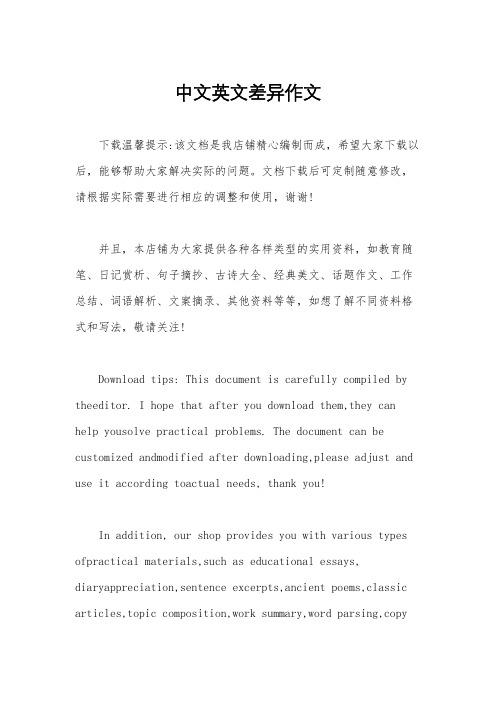
中文英文差异作文下载温馨提示:该文档是我店铺精心编制而成,希望大家下载以后,能够帮助大家解决实际的问题。
文档下载后可定制随意修改,请根据实际需要进行相应的调整和使用,谢谢!并且,本店铺为大家提供各种各样类型的实用资料,如教育随笔、日记赏析、句子摘抄、古诗大全、经典美文、话题作文、工作总结、词语解析、文案摘录、其他资料等等,如想了解不同资料格式和写法,敬请关注!Download tips: This document is carefully compiled by theeditor. I hope that after you download them,they can help yousolve practical problems. The document can be customized andmodified after downloading,please adjust and use it according toactual needs, thank you!In addition, our shop provides you with various types ofpractical materials,such as educational essays, diaryappreciation,sentence excerpts,ancient poems,classic articles,topic composition,work summary,word parsing,copyexcerpts,other materials and so on,want to know different data formats andwriting methods,please pay attention!Chinese and English are really different. In Chinese, there are many characters and each one has its own meaning. But in English, it's all about letters.The grammar in Chinese and English is also not the same. Chinese grammar seems more flexible, while English has more strict rules.And the pronunciation! That's a big difference. Chinese has its own tones, and it can be hard for English speakersto get right. English pronunciation has its own challenges too.The way we write in Chinese and English is different too. Chinese writing looks so beautiful with all those strokes, but English writing is more simple in a way.The vocabulary in both languages is vast and unique.There are words in Chinese that don't have an exact equivalent in English, and vice versa.。
语文作文中英文的区别
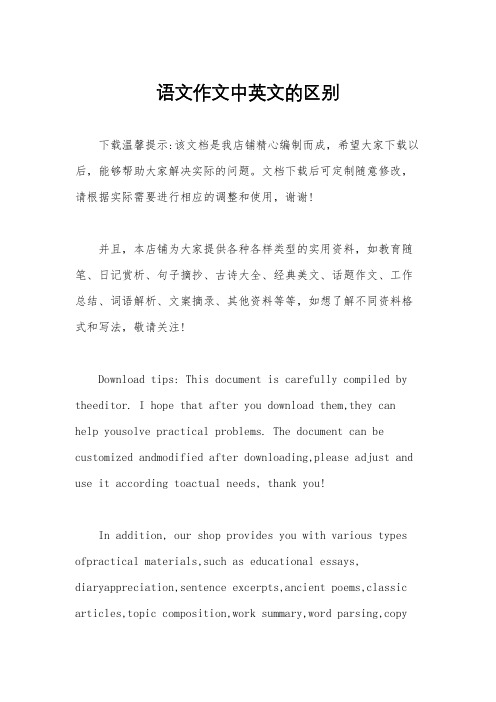
语文作文中英文的区别下载温馨提示:该文档是我店铺精心编制而成,希望大家下载以后,能够帮助大家解决实际的问题。
文档下载后可定制随意修改,请根据实际需要进行相应的调整和使用,谢谢!并且,本店铺为大家提供各种各样类型的实用资料,如教育随笔、日记赏析、句子摘抄、古诗大全、经典美文、话题作文、工作总结、词语解析、文案摘录、其他资料等等,如想了解不同资料格式和写法,敬请关注!Download tips: This document is carefully compiled by theeditor. I hope that after you download them,they can help yousolve practical problems. The document can be customized andmodified after downloading,please adjust and use it according toactual needs, thank you!In addition, our shop provides you with various types ofpractical materials,such as educational essays, diaryappreciation,sentence excerpts,ancient poems,classic articles,topic composition,work summary,word parsing,copyexcerpts,other materials and so on,want to know different data formats andwriting methods,please pay attention!Language is a fascinating thing. It's like a puzzlethat we're all trying to solve, but the pieces keepchanging shape and color. Sometimes it feels like we're getting closer to understanding it, and other times itfeels like we're just stumbling around in the dark.When I write in Chinese, I feel like I have to be more formal and structured. There are so many rules to follow, and the characters themselves are like little pieces of art. It's a beautiful language, but it can also be quite intimidating.But when I write in English, it's like I can breathe a little easier. I can be more casual and relaxed, and Idon't have to worry so much about getting every littledetail exactly right. It's a more flexible language, and it gives me the freedom to express myself in a way that feels more natural.Of course, both languages have their own unique challenges. Chinese can be incredibly precise and nuanced, while English can be frustratingly ambiguous and full of exceptions. But that's what makes them so interesting to work with. It's like trying to solve two different puzzles at the same time.I think that's why I love writing in both languages. Each one gives me a different perspective and a different set of tools to work with. It's like having two different sets of colored pencils to choose from – sometimes you want the bold, vivid colors of Chinese, and other times you want the softer, more subtle shades of English.So, whether I'm writing in Chinese or English, I'm always excited to see what new challenges and surprises each language has in store for me. It's a never-ending puzzle, but that's what makes it so much fun.。
中英文写作差异PPT文档共29页

36、如果我们国家的法律中只有某种 神灵, 而不是 殚精竭 虑将神 灵揉进 宪法, 总体上 来说, 法律就 会更好 。—— 马克·吐 温 37、纲纪废弃之日,便是暴政兴起之 时。— —威·皮 物特
38、若是没有公众舆论的支持,法律 是丝毫 没有力 量的。 ——菲 力普斯 39、一个判例造出另一个判例,它们 迅速累 聚,进 而变成 法律。 ——朱 尼厄斯
40、人类法律,事物有规律,这是不 容忽视 的。— —爱献 生
谢谢!
36、自己的鞋我们唯一不会改正的缺点是软弱。——拉罗什福科
xiexie! 38、我这个人走得很慢,但是我从不后退。——亚伯拉罕·林肯
39、勿问成功的秘诀为何,且尽全力做你应该做的事吧。——美华纳
40、学而不思则罔,思而不学则殆。——孔子
